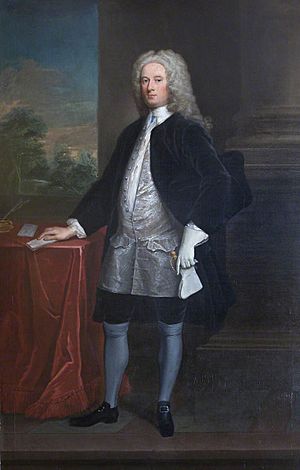Henry Kelsall facts for kids
Henry Kelsall (born around 1692, died 1762) was an important person in British government. He came from Colkirk, a place in Norfolk, England. Henry Kelsall was a politician who served in the House of Commons (like the UK Parliament today) from 1719 to 1734. He also worked as a senior administrator in the Treasury, which manages the country's money.
Early Life and Education
Henry Kelsall was the son of another Henry Kelsall, who lived in Chester. Young Henry went to Westminster School, a famous school in London. There, he was a schoolmate of Thomas Holles, who later became the powerful Duke of Newcastle.
After Westminster, Henry Kelsall went to Trinity College, Cambridge when he was about 15 years old, in 1708. He studied hard and became a fellow (a senior member of the college) in 1714.
Working in Government
In November 1714, Henry Kelsall got a job as a Senior Clerk at the Treasury. This was likely thanks to his friend, the Duke of Newcastle, who had a lot of influence. Kelsall kept this important job for the rest of his life.
His connection to Newcastle also helped him become a Member of Parliament (MP). In 1719, he was elected as the MP for Chichester. Later, in the 1722 election, the government helped him become the MP for Bossiney.
After a senior official named William Lowndes passed away in 1724, Henry Kelsall became the second-in-command at the Treasury. He played a key role in creating the country's money laws each year. In the 1727 election, he was elected as the MP for Mitchell.
Later Life and Achievements
Henry Kelsall decided not to run for Parliament in 1734. However, he was appointed as a commissioner of land taxes in 1735. This meant he helped manage taxes on land. He still kept his main job at the Treasury.
In 1736, Henry Kelsall became a Fellow of the Royal Society. This is a very old and respected group of scientists. It shows that he was also interested in learning and science.
In 1761, he tried to sell his position as a tax commissioner, but the Duke of Newcastle did not allow it.
Henry Kelsall asked the Duke of Newcastle for a small pension (a regular payment) for his daughter in February 1762. He passed away shortly after, on February 10, 1762. His daughter did receive the pension.
 | John T. Biggers |
 | Thomas Blackshear |
 | Mark Bradford |
 | Beverly Buchanan |


